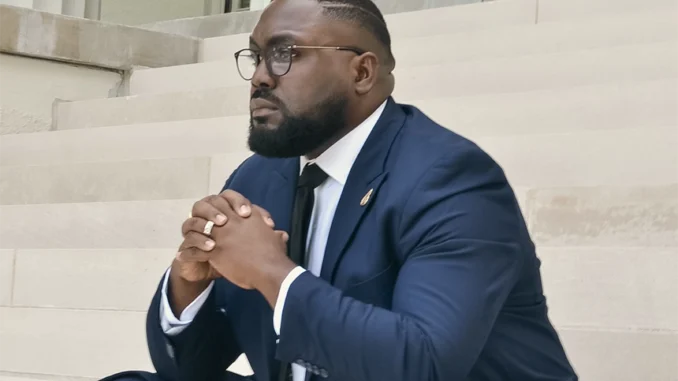
By Staff
Tell us about your educational journey.
My educational journey is really a story of faith, resilience, and learning to lead. (Haha) It’s kind of wild to sit back and think about it all because I rarely take the time to reflect on where I’ve come from. But I should—it’s been quite the ride. I started out in Madisonville, a small town in Western Kentucky, in a neighborhood called the Pride Projects. Life there was tough, you know, but it taught me the real value of community and grit. I think everyone in my neighborhood had a PhD in survival and hope—they really wanted better for me and kids my age.
Then, my family moved to Indianapolis, and I landed in the public school system there. I went to Arlington High School, which, at the time, was struggling with some of the lowest scores and graduation rates in the country. Despite that, I managed to excel, finishing with a 3.8 GPA. Being class president and working as an intern for the superintendent, I got a firsthand look at the complexities of running a school, which sparked my interest in educational leadership.
From there, I headed to Kentucky State University—the state’s only public HBCU—on both band and academic scholarships. But man, that transition was tough. Putting it nicely, I wasn’t prepared for the rigor of college life. Keeping it real-I majored in social activities and minored in academics. I was truly overexposed and underdeveloped and quickly sank. I didn’t stick to that grit I was brought up with and, well, I failed out and lost my scholarships. That was a real low point, but also a moment for some serious reflection.
That setback pushed me to join the military, where I found the structure I needed and got my confidence back. The military wasn’t just about discipline; it also reignited my passion for education, giving me opportunities to train and lead. That drive brought me back to school, and now I’m working towards a Ph.D. in Leadership and Policy Management at Jackson State University.
Looking back, from the projects of Madisonville to becoming a Ph.D. candidate and a leader in higher education—it’s not been a straightforward path, but it’s been incredibly rewarding. It really shows the power of education and the critical importance of perseverance, support systems, and embracing those second chances.
How has your education impacted your life?
Looking at my educational journey from the perspective of worthiness is a powerful reminder of how transformative education can be, especially for someone like me, coming from the Projects in Madisonville. Statistically speaking, I wasn’t supposed to make it this far—I’m a first-generation college student, a first-generation professional, and a first-generation Ph.D. These aren’t just personal milestones; they’re beacons of what’s possible against the odds.
Education has not only changed my life; it’s fundamentally altered the trajectory of my entire family. It’s provided me with opportunities that were once unimaginable—access to stable careers, the ability to influence educational policies, and the platform to advocate for those who are still where I once was. More than just lifting myself, education has given me the tools to lift others, to break generational cycles of setbacks, and to pave a path forward for the next generation.
The real impact of my education is seen in the stability it’s brought. It’s more than economic stability; it’s the emotional and psychological stability of knowing I can achieve things once thought beyond reach. It’s about setting a new standard, a new expectation for what people from places like Pride can achieve. Every step I’ve taken academically has been a step toward rewriting my narrative from one of limitation to one of endless possibilities.
So, when I think about how education has impacted my life, it’s deeply intertwined with a sense of worthiness. It’s about proving—not just to the world but to myself—that where you start doesn’t have to dictate where you finish. My educational achievements have been a defiant declaration that I am worthy of every success, every opportunity, and every chance to make a difference. And this is why I strive to ensure that education continues to be a liberating force for others coming from similar backgrounds.
What can be done to improve the college graduation rate?
I am a strategic leader in enrollment management and student affairs. From experience and research, improving college graduation rates is about more than just tweaking policies or increasing funding—it’s about fundamentally rethinking how we engage and support students from enrollment to graduation. We need to meet this generation of students where they are, more digitally integrated than ever, while still emphasizing the crucial human connections that underpin educational success.
One key strategy is leveraging technology. I’ve seen significant success in using big data and analytics to create predictive models that identify students at risk of dropping out based on their behavior patterns. This approach isn’t about reducing students to numbers; it’s about understanding their unique challenges and stepping in effectively before they reach a crisis point. It’s essential for colleges and universities to invest in systems that can alert advisors when a student’s grades begin to slip or participation drops, enabling immediate, personalized support.
However, technology alone isn’t the solution; it must be paired with genuine relationship building. This means investing in more than just academic support—it’s about creating a supportive community around each student. Programs that pair students with peer mentors have shown great promise. These mentors can share their own experiences and offer advice on navigating both academic and personal challenges.
It’s also crucial to integrate families and communities into the educational process. When students feel supported by both their institution and their loved ones, the pressures of college life often become more manageable. This is why integrating family orientation programs, regular updates, and community engagement initiatives can make a significant difference.
The COVID-19 pandemic has also shifted the higher education landscape, revealing vulnerabilities and paving new pathways. Particularly hard-hit have been first-generation college students, who often lack the same level of home support or resources as their peers. These students have faced increased challenges, from lack of access to technology and quiet study spaces to the loss of crucial on-campus support.
With that, the pandemic has also accelerated trends towards alternative education paths. Data suggests a potential sharp decline in traditional college enrollment over the next five years, with students increasingly opting for quicker certification and degree options. This shift is partly driven by advancements in technology and a job market that values skills and practical experience over traditional degrees. We’re now educating Generation Z and Generation Alpha—youth for whom digital interfaces and rapid information processing are the norm.
To tackle these challenges, we need a multifaceted approach that includes continuing to develop and fund support programs specifically designed for first-generation college students. These programs should provide not just academic but also emotional support, with services like mentoring, tutoring, and counseling easily accessible remotely.
As education shifts to cater to the AI Generation, higher education institutions must also adapt by expanding offerings of certificate programs and associate degrees that can be completed quickly and provide immediate workforce entry. These programs should be designed with input from industry leaders to ensure they meet current job market demands.
We also need to integrate advanced technology into our teaching methodologies, including AI tutors for personalized learning experiences, VR for immersive learning environments, and blockchain for secure, transparent credentialing.
The curriculum itself must evolve to remain relevant in the 21st century. We’re moving away from traditional lecture-based models towards more interactive, problem-based learning, integrating coding and digital literacy into all areas of study to prepare students for a tech-driven world.
Finally, ensuring that every student has access and services to reliable internet and modern computing devices is more critical than ever. Institutions must collaborate with government bodies and private organizations to provide the necessary resources, preventing disparities in access from undermining educational equity.
The pandemic has underscored that resilience in education requires both innovation and inclusivity. Looking forward, it’s clear that traditional educational pathways may no longer suffice for everyone. By embracing these changes and addressing them head-on, we can ensure that all students, regardless of background, are equipped to succeed in an increasingly complex and digital world.
Why are HBCUS still critical to our culture?
As an alum of Kentucky State University, this question reignites my passion for HBCUs today. I am who I am largely in part because of my HBCU experience. Our schools remain an essential pillar in the landscape of American higher education, and their importance transcends the practical aspects of providing academic training. They are incubators for character, justice, and democracy, deeply intertwined with America’s historical and ongoing pursuit of equity.
At the heart of what makes the HBCU so pivotal is her unyielding commitment to nurturing not only the intellectual but also the personal growth of her students. She offers more than just an education; she provides a profound exploration of self. I promise you, no one else is going to expose you to yourself like an HBCU. This is because she does more than educate; she transforms. She challenges students to not only achieve academically but to also understand and fulfill their potential as agents of change.
The foundational mission of the HBCU speaks volumes. If you were to examine the mission statements of any of the 107 HBCUs in the United States—from KSU to Tugaloo—you would find recurring themes of truth, justice, service, and character building.
This transformative education goes well beyond race, color, or phenotype. It’s about the kind of citizens the nation is producing. The HBCU is renowned for graduating individuals who are ready and willing to push back against the tides of history that have perpetuated inequality and to help reshape our society to better meet its ideals. In the words of the United Negro College Fund “HBCUs gives students the audacity to be leaders”, instilling in them the courage and conviction to pursue leadership roles and make significant impacts.
Look, anyone looking for an education that is deeply rooted in character development and societal transformation would do well to consider an HBCU. Here, education is not just about learning in a traditional sense but about being equipped to contribute meaningfully to society and to live out the ideals of truth and justice. Thus, the relevance of HBCUs today is as significant as ever—they are not just educational institutions but crucibles for developing leaders who are prepared to contribute positively to society and democracy.
Not to mention, at the heart of every HBCU pulses a vibrant soul, a rich tapestry of culture and tradition that transcends academia. The essence of HBCUs is vividly brought to life through the rhythmic beats of the marching bands, the dynamic fellowship on “the yard” between classes, and the precision of Greek organizations stepping in unison. Not to mention the annual homecoming—a veritable family reunion where the aromas of smoked meat and fried catfish mix with the excitement of football, lingering long after the festivities have ended. Each of these elements expresses the identity, community, and indomitable spirit that are the hallmarks of the HBCU experience.
And I’d go a step further to say that as we look to the future, the health of our society depends significantly on the continued support and thriving of these institutions. Just as one would care for the heart with the utmost priority, so too must we prioritize the nurturing, funding, and elevation of HBCUs. The HBCU is not only educational sanctuaries but also beacons of hope and progress, critical to shaping a world that reflects the truest aspirations of our democratic ideals.
Where are African American males in this playing field of education?
I’m getting ready to tell you what I know, not what I heard! (HAHA) African American males are often caught at a crossroads of systemic challenges and new opportunities in American education. They’re consistently some of the most underserved students, facing high dropout rates and disproportionate discipline that can trap them in a cycle of disenfranchisement.
Despite these obstacles, there’s a real hunger for education within the community. Take, for example, the Black Males Working Academy in Lexington, KY, which I’m involved with. For the past twenty years this program targets the unique hurdles these young men face, offering them the mentorship, academic support, and emotional backing they desperately need and often miss out on.
A significant factor enhancing the education of African American males is fatherhood, the influential presence of father figures, and strong male role models. Having a positive male influence in the home and community can profoundly uplift academic performance and behavior. It’s more than just about being present; it’s about active engagement. That’s why it’s essential for educational programs to incorporate and celebrate these role models. Men like myself strive to serve as sources of stability, guidance, and inspiration, showing young men that their goals are achievable and that success is within their grasp. By providing a positive vision of what’s possible, we help cultivate an environment where these young men can thrive and see themselves as future leaders and contributors to society.
Education for African American males extends far beyond the confines of traditional learning; it’s fundamentally about leadership and community engagement. As a Ph.D. student navigating a rigorous program, I experience firsthand how education molds us into the next generation of thinkers, governmental leaders, and transformative agents who are poised to challenge the status quo and drive forward societal progress.
It’s important to correct misconceptions that depict Black men as unengaged or unambitious. it’s a disservice to the vibrant community that has continually demonstrated resilience and commitment to success. In fact, these stereotypes fall apart in the face of the robust community and legacy of excellence upheld by African American men, particularly through organizations like historically black Greek letter organizations. As a proud member of Alpha Phi Alpha Fraternity, Inc., I am part of a century-old network that champions education, leadership, and service. Alpha Phi Alpha, along with other black Greek organizations, has been instrumental in laying a strong foundation for Black male success, promoting a culture of high achievement, community service, and brotherhood.
Our educational journey is profoundly about overcoming barriers and empowering the next generation. To truly support African American males, our educational systems must evolve to not only provide knowledge but also to celebrate and incorporate the cultural wealth these students bring. This approach acknowledges their unique contributions and ensures they are well-equipped to lead and enrich our communities and beyond.
Investing in the education of African American Males is not just ethical; it’s strategic. Proper support can help these young men excel academically and contribute meaningfully across various sectors. Realizing this potential requires a solid commitment from everyone—governments, schools, and communities— to make significant structural changes.
So, the path for African American males in education is marked by resilience, determination, and immense potential.
How important is it for more African American men to work in higher education?
Having more African American men in higher education is crucial. It’s healing work. I practically define “Healing Work” as tackling systemic injustices to create inclusive, supportive communities where everyone can grow. It involves repairing harm, building trust, and opening avenues for equity and justice. This work also focuses on providing access to opportunities, ensuring all individuals feel valued, respected, and empowered to thrive.
Think about it: when we talk about shaping the minds and futures of students, the impact of seeing someone who looks like you, who has perhaps walked a similar path, cannot be underestimated. It’s transformative. This isn’t just about filling diversity quotas. It’s about how deeply influential these roles are in mentoring, teaching, and leading by example.
For students, particularly those of color, seeing African American men in faculty and administrative positions can profoundly inspire them to pursue their own academic and professional ambitions. It sends a powerful message: ‘Yes, you can achieve this too, and here’s how you can do it.’ The influence of these role models extends beyond those they mentor directly; it permeates the entire campus culture, shaping how all students, regardless of their backgrounds, view leadership and success. I vividly remember my first encounter with an African American male classroom teacher at John Marshall Middle School in Indianapolis—it was in 7th grade, and I had Mr. David Johnson for language arts. That same year, Mr. Steve Douglas was the principal. These men were not only impeccable in their roles but also set a tone of excellence and possibility that resonated not just with the Black males in the building but with everyone. Their presence was transformative, illustrating the critical impact of having African American male leaders in educational settings.
I’ll go a step further. When I served as a classroom teacher and building administrator, and even now as a leader in higher ed I modeled my teaching, learning, and leadership styles after theirs with great success. Their example not only shaped my approach but also reinforced the importance of strong, positive leadership in educational settings.
I’d also say, African American men bring unique perspectives that can enrich the curriculum and the academic dialogue at a college or university. Their insights help ensure that the educational content is inclusive and reflects a diverse range of histories and experiences. This isn’t just important for students of color; it’s vital for all students to be exposed to a wide spectrum of viewpoints.
Having more African American men in higher education is crucial for advancing social justice. These educators and administrators often lead the charge in advocating for policies and practices that promote equity and inclusion within their institutions and the broader community. But the impact of their work extends beyond policy—it’s fundamentally about healing. Diverse educational environments not only prepare students to succeed in a globalized world but also promote healing across communities. Employers value cultural competence and the ability to navigate diverse environments, skills that are enhanced in institutions rich in diversity. Graduates from these environments are well-prepared to lead and innovate in an increasingly interconnected world.
Brother Yolo Akili Robinson of the Black Emotional and Mental Health Collective articulates it powerfully: ‘Healing work without healing justice—without an analysis of systems of power, without an invitation to evolve our imaginations—is not healing. It’s conformity and a reductive colonial caricature of liberation.’
We must continue to advocate for increasing the presence of African American men in higher education. It’s about making a strategic investment in the future—one that enriches individual students, educational institutions, and society at large. It’s about fostering environments where the next generation of leaders can thrive, where academic discussions are more inclusive, and where social progress is vigorously pursued.
About
DeMarcus Hopson is a native of Madisonville, KY, and is the oldest son of six children. As an educator, favored public speaker, and gifted orator, Hopson brings a wealth of knowledge across various subjects, ranging from Military History and the nuanced experiences of Historically Black Colleges and Universities to cultural competency and the dynamics of educating males of color. His insights into historically black Greek-lettered fraternity and sorority life, the contemporary Christian journey, and the multifaceted history of the United States are deeply informed by his understanding of Diversity, Equity, Inclusion, and Belonging. His thought-provoking contributions have been featured in respected publications such as the Kentucky Bluegrass Guard Magazine, American Baptist News Paper, and the United States DOD Press. DeMarcus’ remarkable talent for distilling complex topics into accessible and practical insights, particularly in higher education policy, enrollment management, and student affairs, has established him as a trusted mentor and advisor. His strategic guidance is routinely sought after for its clarity and capacity for positive outcomes in educational settings.
Known for his transformative and cooperative leadership style, consistently cultivating environments where teamwork and collective achievement are paramount. Hopson’s leadership methodology is characterized by open dialogue, mutual respect, and a shared pursuit of common objectives, all of which have been instrumental in bringing together diverse groups to accomplish unified goals. His leadership acumen extends beyond internal team dynamics, involving community stakeholders, alums, and industry experts to enhance the educational experience. This approach, grounded in inclusivity and collaboration, not only drives the growth of the institutions but also fosters a holistic, student-focused educational environment. This reflects his unwavering dedication to academic excellence and ensuring equitable access to education. Additionally, in the past three years, Hopson successfully secured, managed, and allocated over 1.5 million dollars in grants and sponsored programs.
In his educational pursuits, DeMarcus graduated from Kentucky State University in Frankfort, KY, the US Army Command and General Staff College, and the Army University, both located in Ft Leavenworth, KS. He is furthering his academic endeavors by pursuing an Executive Ph.D. in Higher Educational Leadership at Jackson State University in Jackson, MS.
After more than thirteen years of dedicated service, DeMarcus honorably concluded his career with the United States Army. His tenure in the military was distinguished by various leadership roles, such as Command State Historian, Army Recruitment Operations Specialist, and Strategic Leader within the 2/138th Field Artillery Battalion of the 138th Fires Brigade, particularly during deployments. This experience cemented his reputation as a leader both in uniform and beyond. In the civilian sphere, DeMarcus continues to demonstrate his leadership prowess. He actively participates in various professional, civic, and community organizations, taking on numerous leadership and supportive roles and continuing his commitment to service and community engagement.
Hopson is the Associate Vice President for Enrollment Management and Student Access at Georgetown College in Georgetown, KY.
DeMarcus believes our availability is our greatest asset and wishes to use his gifts and talents to propel the communities toward continuous progress and elevation. As a proud member of Alpha Phi Alpha Fraternity, Inc., he embodies the fraternity’s ideals in his personal and professional life. Hopson is joyfully married to the love of his life, and together, they are the doting parents of three daughters.











